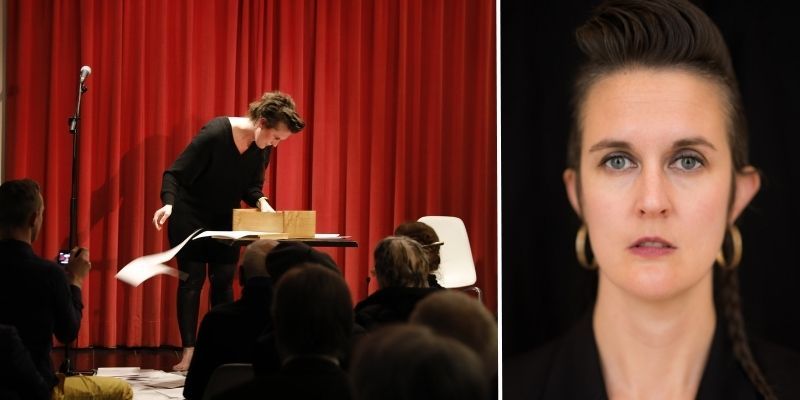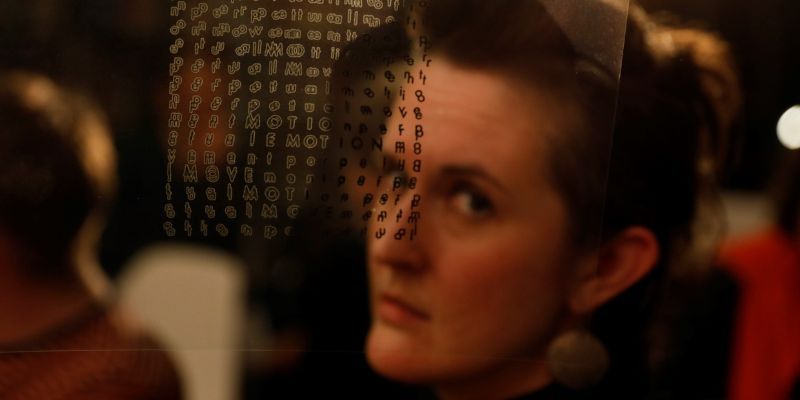
A moving poem about living with young onset Parkinson's has been penned by an academic at the University of Leeds to mark World Parkinson’s Day.
‘Moving Nowhere Here' was written by Dr Kimberly Campanello, an accomplished poet and Associate Professor of Creative Writing in the School of English.
Kimberly has young onset Parkinson’s, a neurological condition that causes problems, mainly with movement, that get worse over time. She was diagnosed in 2021 after several years of her symptoms being associated with other issues, such as nerve damage and stress, partly because it's uncommon to see Parkinson's in people younger than 50.
Kimberly is speaking out about her experiences to mark World Parkinson’s Day, which takes place on 11 April every year to raise awareness of the condition.
I think a lot of women present with chronic illnesses and they're not diagnosed or taken seriously because it's assumed that our hormones or our complex lives are causing us pain, rather than something else.
She said: “One of the things that’s difficult with any invisible illness or disability is that nobody knows what you’re experiencing.
“Sometimes, it can be excruciating for me to cross a room – my legs become stiff and it’s like I’m walking through cement. My tremor is the least of my problems, but people often assume otherwise.”
‘Moving Nowhere Here’
Kimberly wrote ‘Moving Nowhere Here’ while she was awaiting diagnosis, focusing on the feeling of being stuck as she was undergoing various tests, waiting for clarity and treatment.
In this passage she describes the sleep disturbances she experienced that are an early sign of Parkinson’s:
begins with shouting
in sleep I am naked
on the carpet in a power stance
sensing an army nearby
I am charging the ghost
hanging on the back of the door
I am trapped inside the Shimmer
of a spice cupboard
boxed into fetal position
between jars filled with dried Leaves
Kimberly said: “After an intense marking period during the pandemic that was affected by my undiagnosed Parkinson’s symptoms, I began to feel like I’d lost my touch at work and in day-to-day life.
“I eventually saw a neurologist and he told me, ‘If you were 70, I would diagnose you with Parkinson's right now, but because of your age and your gender, I need to do some more tests first.’”
After two months of further tests, Kimberly’s diagnosis was confirmed. She said the additional stress of further testing is a common problem faced by people with young onset Parkinson’s.
Kimberly said: “I think a lot of women present with chronic illnesses and they're not diagnosed or taken seriously because it's assumed that our hormones or our complex lives are causing us pain, rather than something else.”
Kimberly is now calling for more awareness and research into young onset Parkinson’s because there is a knowledge gap about how treatments and outcomes for Parkinson’s intersect with menstruation, perimenopause and menopause.
She said one of the challenges faced by all people with Parkinson’s is that: “Whatever medication you’re trying, you don't know if it’s going to work, what side effects it's going to cause and then how long it's going to be effective for, because your brain is changing degeneratively at the same time that you're trying to treat the symptoms. And then time passes, and everything's changed again.”
When Kimberly returned to work, she sought support from the charity Parkinson’s UK. Her neurologist assigned her a Parkinson’s nurse to help with day-to-day life and advise on medication. The University’s counselling service also helped her to work through the difficult feelings that came after diagnosis. Kimberly said support from her line manager, colleagues and her trade union representative have been invaluable.
Bright and brilliant

To mark World Parkinson’s Day this year, Parkinson’s UK is celebrating all that is bright and brilliant within the community and beyond.
A Parkinson’s diagnosis can feel like the rug has been pulled out from under you and be an isolating experience, but sharing experiences like this shows just how supportive, inclusive and creative the community is.
Kimberly said: “Reading and writing poetry has always been important to me because it helps me understand and express complex ideas, feelings and states of being. It makes sense that I would grapple with my experience of Parkinson’s in my work.”
For World Parkinson's Day, the charity is also encouraging people to be bright and brilliant and write their own short poem to tell the world how Parkinson’s has affected them or someone they care about.
Paul Jackson-Clark, Director of Fundraising & Experience at Parkinson’s UK, said: “This World Parkinson’s Day we are honoured to once again be joining forces with the Parkinson’s community and celebrate their progress, their tenacity and the countless ways they strive to live better with their condition. Kimberly is a shining example of that.
“A Parkinson’s diagnosis can feel like the rug has been pulled out from under you and be an isolating experience, but sharing experiences like this shows just how supportive, inclusive and creative the community is. They inspire us to fight for them every day, to push for better healthcare, treatments and awareness. So far, we’ve invested over £100 million in groundbreaking research to find better treatments and a cure, and we are here to support everyone living with the condition.”
Further information
Email University of Leeds Press Officer Mia Saunders at m.saunders@leeds.ac.uk with media enquiries.
Read ‘Moving Nowhere Here’ on the Granta website.
Read more about Dr Campanello’s other poetry and watch her performances on her website.